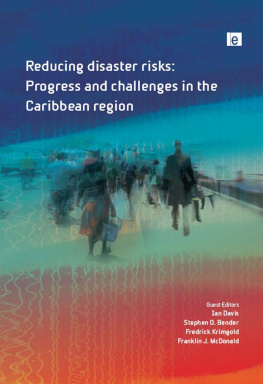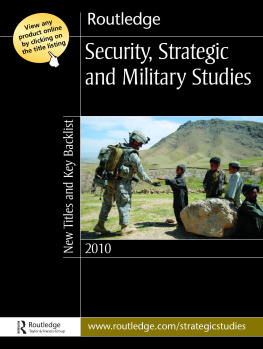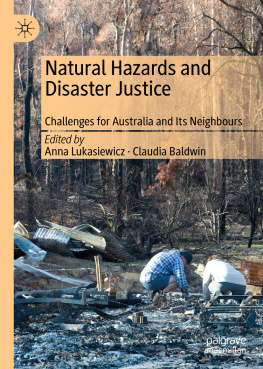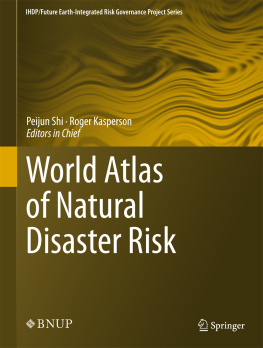COMMUNITY, ENVIRONMENT AND DISASTER RISK MANAGEMENT VOLUME 18
RECOVERING FROM CATASTROPHIC DISASTER IN ASIA
EDITED BY
WILLIAM L. WAUGH, JR.
Georgia State University, USA
ZIQIANG HAN
Sichuan University, China
United Kingdom North America Japan
India Malaysia China
Emerald Publishing Limited
Howard House, Wagon Lane, Bingley BD16 1WA, UK
First edition 2017
Copyright 2017 Emerald Publishing Limited
Reprints and permissions service
Contact:
No part of this book may be reproduced, stored in a retrieval system, transmitted in any form or by any means electronic, mechanical, photocopying, recording or otherwise without either the prior written permission of the publisher or a licence permitting restricted copying issued in the UK by The Copyright Licensing Agency and in the USA by The Copyright Clearance Center. Any opinions expressed in the chapters are those of the authors. Whilst Emerald makes every effort to ensure the quality and accuracy of its content, Emerald makes no representation implied or otherwise, as to the chapters suitability and application and disclaims any warranties, express or implied, to their use.
British Library Cataloguing in Publication Data
A catalogue record for this book is available from the British Library
ISBN: 978-1-78635-296-5 (Print)
ISBN: 978-1-78635-295-8 (Online)
ISBN: 978-1-78714-893-2 (Epub)
ISSN: 2040-7262 (Series)
ABOUT THE EDITORS
William L. Waugh Jr. is professor emeritus in the Andrew Young School of Policy Studies at Georgia State University and the editor-in-chief of the Journal of Emergency Management. Dr. Waugh is the author of International Terrorism (1982); Terrorism and Emergency Management (1990); and Living with Hazards, Dealing with Disasters (2000); and the coeditor of Handbook of Emergency Management (1990); Cities and Disasters (1990); Disaster Management in the U.S. and Canada (1996); and Emergency Management: Principles and Practice for Local Government, 2nd ed. (2007); he has published over 200 articles, chapters, essays, and reports in the United States, Canada, Europe, and Asia. His current research focuses on collaboration in disaster management and capacity-building for community resilience.
Dr. Ziqiang Han is associate professor at the Institute for Disaster Management and Reconstruction, Sichuan University-The Hong Kong Polytechnic University in China. He is also a joint researcher at the Center for Crisis Management Research, Tsinghua University. His research interests are disaster recovery and sustainable development, multiorganizational cooperation in emergency management, risk perception and decision making, institutional disaster preparedness, and disaster education. Dr. Han has published a number of papers on Natural Hazards; Risk, Hazards, and Crisis in Public Policy; International Journal of Disaster Risk Science; China Emergency Management Journal; Journal of Risk, Disaster and Crisis Research.
ABOUT THE AUTHORS
Morio Onda is a professor of sociology at Ryutsu Keizai University, Chiba Prefecture, Japan. He received his Ph.D. in sociology from the University of Tokyo. He is the director of the Society of Economic Sociology and had edited the Annual of the Society of Economic Sociology. His research interests are the study of mutual help networks as spontaneous social order and indigenous social development. His publications include Hatten no Keizaishakaigaku (Economic Sociology of Development, Tokyo: Bunshindo, 1997), Kaihatsushakaigaku (Development Sociology, Kyoto: Minerva Publishing, 2001), Gozyoshakairon (Mutual Help Society, Kyoto: Sekaishisosha, 2006), and Igakuseinotamenoshakaigaku (Sociology for Medical Students, Kyoto: Koyoshobo, 2016).
Jos Manuel Mendes holds a Ph.D. in sociology from the Faculty of Economics of the University of Coimbra, Portugal, where he is an assistant professor with aggregation. He is also a researcher at the Centre for Social Studies, where he has been working in the fields of inequalities, social mobility, social movements, and collective action and, more recently, on the themes of risk and social vulnerability. He is the coordinator of the Risk Observatory (OSIRIS) of the Centre for Social Studies, co-coordinator of the Doctoral Programme Territory, Risk and Public Policies, and is the editor-in-chief of Revista Crtica de Cincias Sociais. His most recent book is co-authored with Pedro Arajo: Sofrer e morrer onde se est (To Suffer and to Die Where You Are), Coimbra: Almedina, 2016.
David N. Nguyen was born and raised in Hawaii, United States. He received a master of arts in geography from the University of Hawaii, specializing on tourism, economics, and transportation geography. At the same time, he received a certificate in disaster management and humanitarian assistance from the Department of Urban and Regional Planning. He is currently a final year doctoral student at Tohoku Universitys Department of Civil Engineering, specializing in disaster management in the tourism sector and will graduate in 2017. During his time in Japan, David has worked in the Okinawan tourism industry, promoting tourism in the Tohoku Region of Japan. David has published work related on sustainability, energy, international relations, and cuisine.
Fumihiko Imamura is a professor of tsunami engineering and the director of the International Research Institute of Disaster Science (IRIDeS) at Tohoku University. He received his doctoral of engineering in 1989 and became a research associate in 1989, an associate professor in 1992, and a professor of Tohoku University in 2000. He joined the IRIDeS in April 2012 as the vice director of the Disaster Control Research Center, Graduate School of Engineering, Tohoku University, in 20102012.
He is an expert on tsunami modeling, mitigation planning, and education/awareness. He has conducted field surveys as leader for earthquakes and tsunami damage investigation since the 1992 Nicaragua and Flores Island in Indonesia. In addition, he is the secretary for the International TIME (Tsunami Inundation Modeling Exchange) Project, which is supported by the Intergovernmental Oceanographic Commission, the International Union of Geodesy, and the Geophysics Tsunami Commission.
Chandra Lal Pandey is an assistant professor at the School of Arts, Kathmandu University. He earned his Ph.D. and postdoctoral fellowship from the University of Waikato, New Zealand. His research expertise includes environmental politics and policy, natural resource and crisis management, community development, resilience building, and crisis management. He has published a number of research articles in high-quality journals including








